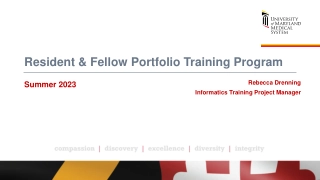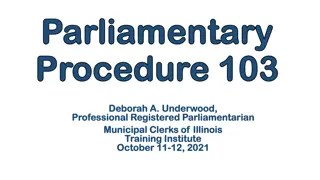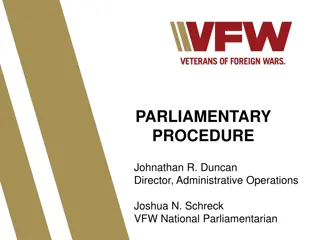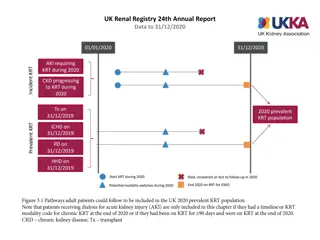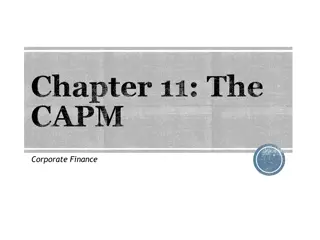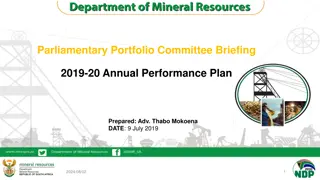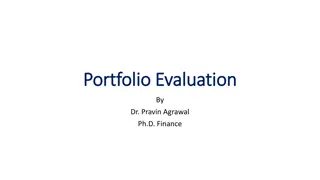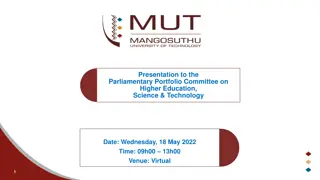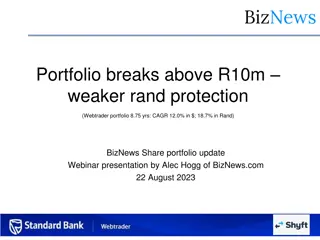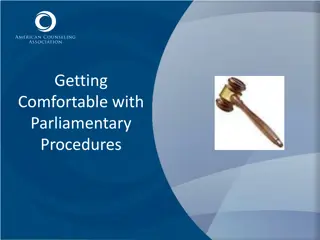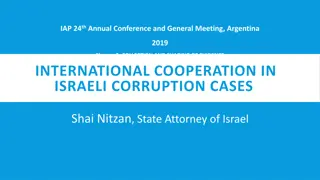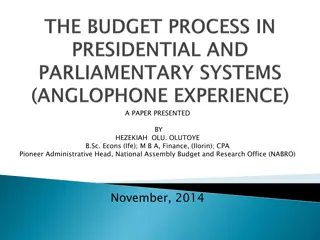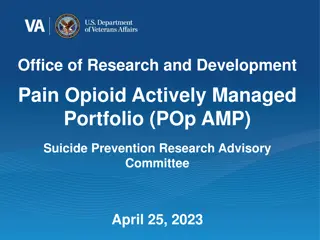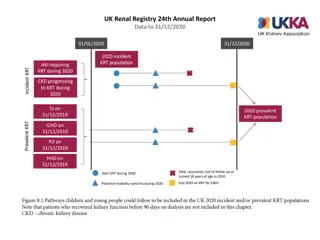Hollywoodbets Presentation to Parliamentary Portfolio Committee on 24th October 2018
Hollywoodbets presented key topics including the National Gambling Regulator, Transitional Provisions, Gambling Policy Council, and Central Electronic Monitoring System to the Parliamentary Portfolio Committee. Discussion points covered the need for the National Gambling Regulator, governance flaws, and textual repetitions in relevant sections.
Download Presentation

Please find below an Image/Link to download the presentation.
The content on the website is provided AS IS for your information and personal use only. It may not be sold, licensed, or shared on other websites without obtaining consent from the author. Download presentation by click this link. If you encounter any issues during the download, it is possible that the publisher has removed the file from their server.
E N D
Presentation Transcript
Hollywoodbets Hollywoodbets Presentation to Parliamentary Portfolio Committee 24 October 2018
Structure: Four main topics Structure: Four main topics 1. The National Gambling Regulator 2. Transitional Provisions 3. The Gambling Policy Council 4. Central Electronic Monitoring System
Preliminary note: Different Bills Preliminary note: Different Bills Hollywood Amendment Bill, 2018 made available by the DTI online and seemingly placed before the National Assembly ( The Amendment Bill ) delivered submissions on the National Gambling On 19 October 2018, the PPC sent an email attaching inter alia a document described as the draft Bill. The file name included 19October2018@12h26 ( The 19 October Bill ). The status of the 19 October Bill is unclear. It differs materially from the Amendment Bill.
Topic 1: The National Gambling Regulator Topic 1: The National Gambling Regulator Hollywood addresses three broad issues: (a) Part A: Is there a need for the NGR to replace the NGB? (b) Part B : Governance flaws in the proposed NGR structure (c) Part C: Textual repetition in Section 65
Part Part A A: : Is Is there replace replace the there a a rational the NGB NGB? rational need need for for the the NGR NGR to to The National Gambling Policy states: that the National Gambling Board must be revamped to be a strategic trading entity of the DTI for regulating gambling; the National Gambling Board will accordingly be repositioned and changed into the National Gambling Regulator (NGR) headed by a chief executive officer
Part A Continued: The need to replace the Part A Continued: The need to replace the NGB? NGB? The following remain unclear? (a) how the NGR revamps the NGB? (The NGR seems to be the same as the NGB save for the name and the CEO)? what perceived difficulties with the NGB the NGR purports to address? why there is a perceived advantage in housing the central regulatory body as a unit of DTI? (b) (c)
Part A Continued: The need for the NGR? Part A Continued: The need for the NGR? The Amendment Bill and the 19 October Bill contemplate a significant overhaul of the governance structure without any apparent justifiable basis for the change.
Part B : Governance flaws in the proposed NGR Part B : Governance flaws in the proposed NGR structure structure The existing Act provides for a National Gambling Board headed by a Chairman The proposed structure replaces this with: The National Gambling Regulator Limited decision-making interactions with the Minister of Trade and Industry. Limited appointment of Committees at the discretion of the Minister in terms of section 65C
Part B Continued : Governance flaws in the Part B Continued : Governance flaws in the proposed NGR structure proposed NGR structure The NGR has no governing board. It only has a CEO. Accordingly, there is no decision-making body, with various persons, from various backgrounds, with knowledge and skill in the gambling industry. Hollywood submits that it is undesirable that such power be vested in one person without the obvious benefits of accountability that arise from decisions taken by a lawfully appointed committee or council. It is evident from section 65B that the CEO of the NGR is afforded significant powers and responsibilities, including responsibility for all revenue collected, all expenditure and management of all assets.
Part B Continued : Governance flaws in the Part B Continued : Governance flaws in the proposed NGR structure proposed NGR structure The proposed changes to section 33 are problematic: The revised section 33 will confer power on the NGR to regulate interactive gambling. Interactive gambling is not currently defined. (There is a definition in National Gambling Amendment Act, 2008, but that has not yet come into force. There is a definition of interactive game in the National Act). More fundamentally, centralising the regulatory power at a national level ignores the constitutional scheme of betting legislation. It is a concurrent national and provincial competence. The proposed section 33 removes the constitutionally recognised power of the provinces in relation to interactive gambling .
Part B Continued : Governance flaws in the Part B Continued : Governance flaws in the proposed NGR structure proposed NGR structure Lastly, section 65(3)(c)(i) bars a person from being appointed CEO of the NGR if he / she: has or acquires a direct or indirect financial interest in license issued in terms of this Act, or in premises used for an activity that must be licensed in terms of this Act The exclusion should operate if the person has or acquires an interest issued under the National Gambling Act and any other legislation in terms of which licences are issued.
Part C: Textual repetition in Section 65 Part C: Textual repetition in Section 65 Per item 39(c) of the Amendment Bill (item 27 (c) of the 19 October Bill), the only amendment to section 65(2) changes the reference form the Board to the NGR. Sub-sections (2)(a) onwards are retained unaltered. Per item 39(g) of the Amendment Bill (item 27(g) of the 19 October Bill), new provisions are added as sub-sections in section 65(4). The proposed sub-sections largely mirror what current appears in section 65(2), save for certain changes that pertain largely to the role of the minister. Section 65(2) will conflict with the proposed sections 65(4)(g) onwards.
Part C: Textual repetition in Section 65 Part C: Textual repetition in Section 65 For example, section 65(2)(a) is largely duplicated in the proposed section 65(4)(g). Compare 2(b) with 4(h), 2(c) with 4(i), 2(d) with 4(j), 2(e) with 4(k), and 2(f) with 4(l). Further provisions will be duplicated - compare the existing section 65(4)(a) with the proposed section 65(4)(m) (which is broader but covers the same ground) Further, the existing provisions in s65(4) have a prefix such as may or must where as the proposed new sub-sections (d) (n) do not.
Topic 2: Transitional Provisions Topic 2: Transitional Provisions Section 65A(1) empowers the Minister to appoint the CEO of the NGR. There is no transitional provision to cater for the situation if no CEO is appointed. There should be a transitional provision that the Chairman of the dissolved NGB shall be the CEO of the NGR until further appointment by the Minister.
Topic 3: The Gambling Policy Council Topic 3: The Gambling Policy Council The National Gambling Policy states: the Council has not been able to perform efficiently in ensuring policy co- ordination country wide due to challenges relating to quorum; the Council is always affected by the lack of quorum; the Council must be empowered to make resolutions in the second meeting if the first did not have a quorum
Continued: Topic 3: The Gambling Policy Continued: Topic 3: The Gambling Policy Council Council Proposed Section 63A provides for a deemed quorum. This will occur in a second meeting, if the council remains inquorate. The quorum provisions are rendered superfluous.
Topic 3: The Gambling Policy Council Topic 3: The Gambling Policy Council Hollywood considers section 63A alarming. The perceived practical difficulty of council members being unavailable for meetings cannot justify inquorate decisions. The power of the Council is significant. For example, under section 65(4) the NGR will be obliged to comply with directions issued to it by the Council relating to casinos, racing, gambling, wagering or any other
Topic 3: The Gambling Policy Council Topic 3: The Gambling Policy Council Canadian Courts have recognised the importance of adherence to quorum requirements: a perusal of the jurisprudence that has examined questions related to quorum indicates that the courts have consistently insisted on the necessity for a decision-making authority to strictly comply with quorum requirements at all times. A long series of cases have established a proposition which I would venture to formulate as follows: in setting a quorum and requiring that a minimum number of persons participate in a decision, Parliament reposes its faith in collective wisdom, does so for the benefit of the public as well as for the benefit of those who might be affected by the decision, and expects those who participate in the decision either as members of the majority or as dissenting members to act together up to the very last moment which is the making of one united, though not necessarily unanimous, decision. Having the proper quorum at all relevant times, from the beginning up to the very last moment is a question of principle, of public policy and of sound and fair administration of justice . IBM Canada Ltd. v. Deputy Minister of National Revenue (Customs & Excise) [1992] 1 F.C. 663, 129 N.R. 369: para. 9
Topic 4: Central Electronic Monitoring System Topic 4: Central Electronic Monitoring System The Amendment Bill and the 19 October Bill provide for a CEMS to cover all betting transactions. This system will have to cover online betting, telephone betting, horse racing and the like. These different betting platforms operate through their own unique and customised software It will be a herculean and expensive technological effort to design one central system to monitor all such systems and transactions






